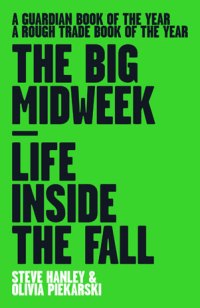
Maybe I shouldn’t have been shocked to hear of the death of Mark E Smith
in February. The evidence of hard living had been etched on his face since he
was thirty, and since I had become a fan, in the early 1990s, he had always
looked at least fifteen years older than his actual age. But having lost
contact with The Fall I hadn’t known he was gravely ill, wheelchair bound and
had been struggling to fulfil concert dates at several points during 2017.
Like many fans of
the band, I suspect, I went through a spell of intense interest in The Fall
(from 1992 to 1994) before moving on and rarely listening to them again. I was
in my final year in school walking from one class to the next when a friend
offered me a listen through one of his earphones to a snatch of ‘Birmingham
School of Business School’. Over a scuzzy electro keyboard, a sarcastic voice
slurred its way through a chorus. It was strange and unattractive but
interesting.
My next exposure to
The Fall was their ‘B Sides 84-89’ album, to which I listened to constantly
over a period of six months until Smith’s voice and words imprinted themselves
in my memory. My friend and I would often say snatches of the lyrics to each
other and the one we quoted most often was ‘Slang King’. A song that contains a bizarre and
rib-tickling mixture of ideas, it begins with Smith declaiming ‘Whip wire!’ and
‘Hawk-man!’ before turning into a song that appears to be about ‘Lord Swingo’
and ‘his triumphant procession’. But
then there’s mention of a ‘lime green receptionist’ and ‘Horst the viking’, and
a reference to three little girls whose fifty pence doesn’t cover the cost of
their chocolate purchases: and so they ‘had
to take, had to put, the Curly Wurley back’. All of which Smith sing-speaks
with complete conviction over typical Fall music: a muscular guitar riff
accompanied by thunderous bass and drums and spooky circular keyboard motif. It was a combination I found baffling,
hilarious and exhilarating.
On another song from the same album, ‘Clear off!’, skeletal
keyboards and liquid guitar create a
suitably eerie soundscape over which Smith, shadowed by a witchy Gavin Friday,
repeats the sinister chorus ‘Over the hill, goes killer civil servant’. But
then, at the end, it turns colloquial when Smith says, as though he is shouting
at someone across his fence: ‘Who’s there? What’s wrong? Clear off!’ This blend of the strange with the prosaic was
one of the hallmarks of Smith’s endlessly intriguing lyrics. At times the songs sounded like Coronation
Street on acid or a Kes/Dark Crystal crossover.
Around the same time, I discovered the NME, the
highlight of which was always the occasional interview with Smith, who espoused
views that you would normally associate with people twice his age and who often
launched attacks on other bands including U2 (most memorably when he claimed
that Jesus would throw bottles at the band). This was delightful for any U2-sceptics
like myself, as in late eighties and early nineties Ireland, the blanket media
cheerleading of U2 was suffocating.
Smith carried the confidence that was so apparent on
the songs and in the interviews onto the stage where his apparent disdain for,
and indifference to, the audience was utterly compelling. The Fall were a
legendarily erratic live band and I had the great fortune to witness just one
bad show out of the five I attended.
Over the years, my interest in the band waned and was replaced
by other sounds though I continued to marvel at Smith’s productivity as I
noticed that hardly a year went by without the release of a new Fall album. I
had seen his obvious physical decline over the years but it was a tremendous
shock to see footage of a wheelchair-bound, cancer-wracked Mark, his body
twisted and misshapen, his face entirely unrecognisable, on-stage in Glasgow at
The Fall’s final gig in October. But
after the feelings of amazement and pity passed I felt more admiration for Mark
than ever before. While most people with such debilitating health problems would
(understandably) be keen to hide themselves away from the public eye, Smith put
the music first and chose to fight on until it just wasn’t possible anymore.




